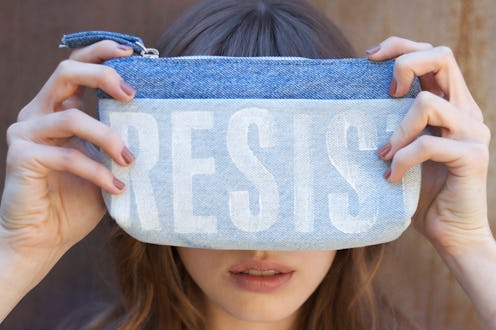News
How To Resist Trump's Threats To The Environment Every Time You Go Shopping

I spend my days fighting injustice through what we wear. As a sustainable stylist and the owner of the ethical fashion boutique Bead & Reel, I focus on how our fashion purchases can pack a political punch. While this may not be the most commonly acknowledged form of activism, fashion is a $3 trillion industry that employs over 50 million people globally, according to FashionUnited. Thus, it can have huge impacts on those who make it, those who wear it, and everything it touches in between.
Under the Trump administration, the role of protecting our environment, our selves, and each other is falling even more heavily on individuals and businesses. I believe that social enterprises and smart shopping can provide real solutions to fighting back with your every day purchases. As something we all participate in every single day, fashion is a powerful tool to create change – or resist it.
For example, you can use fashion choices to impact women's rights. Considering the Trump administration's attempts to restrict Planned Parenthood funding and the president's record of misogynistic rhetoric, I believe that now more than ever we need to support women with our wallets and actions.
According to the National Association of Women Business Owners, in the United States in 2015, women owned only 31 percent of businesses, and only one in five companies worth over $1 million were owned by women. And it’s even worse in fashion. In 2015, exactly zero Fortune 500 apparel companies had female CEOs. Supporting women-owned businesses will put more money into women’s hands – and money talks. "When you invest in women, they typically invest 90 percent back into the health, nutrition and education of their families, as opposed to 30-40 percent for men," said Karen Sherman, Executive Director for Global Programs at Women for Women in an interview for LearnVest.
Resources, like the National Association of Women Business Owners, Women’s Business Enterprise National Council, are all places to find and support women-owned companies fighting to close the wage and power gaps.
The environment is another area where you can realize use the power of the purse strings. In addition to appointing officials who many critics argue do not understand or recognize climate change, Trump has proposed some significant budget cuts to the Environmental Protection Agency, to the tune of a whopping 31 percent and a quarter of all its jobs.
One simple way to keep water safe and clean is to buy fashion that doesn’t need more of it, specifically secondhand fashion
One's fashion purchases can actually be a venue for environmental advocacy, especially as the traditional government resources lose their power and scope. Fashion is the second-largest industrial polluter in the world and accounts for 10 percent of global carbon emissions, according to James Conca writing at Forbes. In his report, Conca also noted that "Nearly 70 million barrels of oil are used each year to make the world’s polyester fiber, which is now the most commonly used fiber in our clothing. But it takes more than 200 years to decompose."
However, by supporting organic cotton, recycled textiles, and other forms of sustainable fashion, the footprint of the apparel industry is greatly reduced. The Ethical Writers Coalition, Project Just, and a growing number of brands that focus on eco-friendly materials all offer ways to support your love of fashion while also supporting a cleaner planet.
In the wake of the Dakota Access Pipeline memorandum and the lead pipes in Flint, Michigan, water safety is also a major concern, and fashion is a longtime culprit. For one, manufacturing clothes is water-intensive. According to Waterfootprint.org, it takes 2,700 liters of water to make just one T-shirt, which is the same amount of water an average person drinks over the course of almost three years.
One simple way to keep water safe and clean is to buy fashion that doesn’t need more of it, specifically secondhand fashion. Online resale shops or your local thrift or consignment store all reduce the need to use more water and resources while saving styles from our already full landfills.
Every time we make a purchase we are casting a vote for the kind of world we want
And if you want to use your fashion buying power to have an impact on workers across the globe, think of the importance of fair trade fashion. The principles of fair trade fashion work to ensure clothing industry employees earn living wages to create financial security and sustainable economies that can support their families and communities.
Of course, there can be concerns about what are legitimate fair trade groups and what aren't, so you've got to be careful. There are several different certifying agencies, including Fair Trade USA, Fair Trade Federation, and World Fair Trade Organization, all of which oversee and offer both fashion and food options. There are also many blogs and stores to easily find ways to be a global ally and support trade in place of aid.
Every time we make a purchase we are casting a vote for the kind of world we want. Now more than ever, we have an opportunity to create a kind of world that protects and cares for the most vulnerable and for ourselves simply with how we shop.